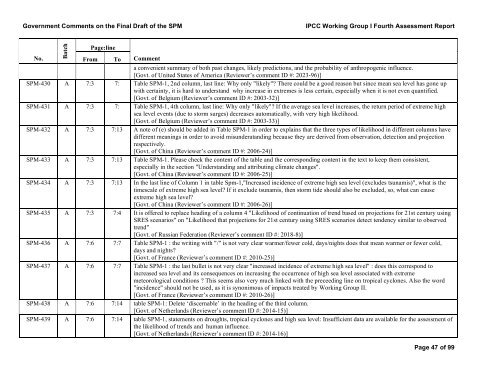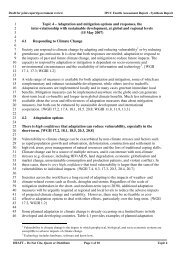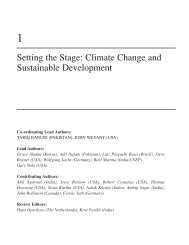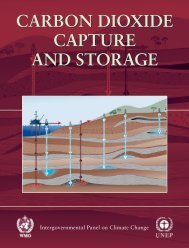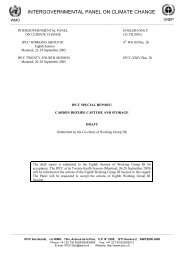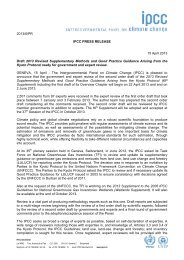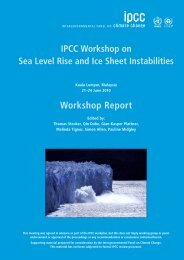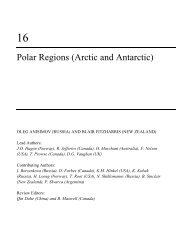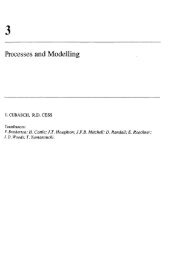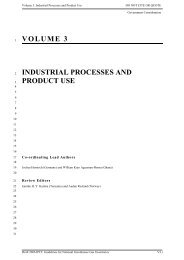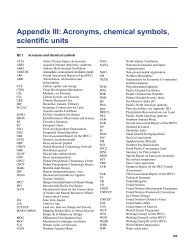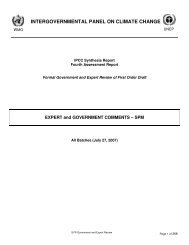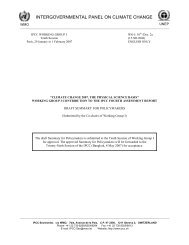Government Comments on the Final Draft of the SPM IPCC Working ...
Government Comments on the Final Draft of the SPM IPCC Working ...
Government Comments on the Final Draft of the SPM IPCC Working ...
Create successful ePaper yourself
Turn your PDF publications into a flip-book with our unique Google optimized e-Paper software.
<str<strong>on</strong>g>Government</str<strong>on</strong>g> <str<strong>on</strong>g>Comments</str<strong>on</strong>g> <strong>on</strong> <strong>the</strong> <strong>Final</strong> <strong>Draft</strong> <strong>of</strong> <strong>the</strong> <strong>SPM</strong><br />
<strong>IPCC</strong> <strong>Working</strong> Group I Fourth Assessment Report<br />
Batch<br />
Page:line<br />
No.<br />
From To Comment<br />
a c<strong>on</strong>venient summary <strong>of</strong> both past changes, likely predicti<strong>on</strong>s, and <strong>the</strong> probability <strong>of</strong> anthropogenic influence.<br />
[Govt. <strong>of</strong> United States <strong>of</strong> America (Reviewer’s comment ID #: 2023-96)]<br />
<strong>SPM</strong>-430 A 7:3 7: Table <strong>SPM</strong>-1, 2nd column, last line: Why <strong>on</strong>ly "likely"? There could be a good reas<strong>on</strong> but since mean sea level has g<strong>on</strong>e up<br />
with certainty, it is hard to understand why increase in extremes is less certain, especially when it is not even quantified.<br />
[Govt. <strong>of</strong> Belgium (Reviewer’s comment ID #: 2003-32)]<br />
<strong>SPM</strong>-431 A 7:3 7: Table <strong>SPM</strong>-1, 4th column, last line: Why <strong>on</strong>ly "likely"? If <strong>the</strong> average sea level increases, <strong>the</strong> return period <strong>of</strong> extreme high<br />
sea level events (due to storm surges) decreases automatically, with very high likelihood.<br />
[Govt. <strong>of</strong> Belgium (Reviewer’s comment ID #: 2003-33)]<br />
<strong>SPM</strong>-432 A 7:3 7:13 A note <strong>of</strong> (e) should be added in Table <strong>SPM</strong>-1 in order to explains that <strong>the</strong> three types <strong>of</strong> likelihood in different columns have<br />
different meanings in order to avoid misunderatanding because <strong>the</strong>y are derived from observati<strong>on</strong>, detecti<strong>on</strong> and projecti<strong>on</strong><br />
respectively.<br />
[Govt. <strong>of</strong> China (Reviewer’s comment ID #: 2006-24)]<br />
<strong>SPM</strong>-433 A 7:3 7:13 Table <strong>SPM</strong>-1. Please check <strong>the</strong> c<strong>on</strong>tent <strong>of</strong> <strong>the</strong> table and <strong>the</strong> corresp<strong>on</strong>ding c<strong>on</strong>tent in <strong>the</strong> text to keep <strong>the</strong>m c<strong>on</strong>sistent,<br />
especially in <strong>the</strong> secti<strong>on</strong> "Understanding and attributing climate changes".<br />
[Govt. <strong>of</strong> China (Reviewer’s comment ID #: 2006-25)]<br />
<strong>SPM</strong>-434 A 7:3 7:13 In <strong>the</strong> last line <strong>of</strong> Column 1 in table Spm-1,"Increased incidence <strong>of</strong> extreme high sea level (excludes tsunamis)", what is <strong>the</strong><br />
timescale <strong>of</strong> extreme high sea level? If it exclude tsunamis, <strong>the</strong>n storm tide should also be excluded, so, what can cause<br />
extreme high sea level?<br />
[Govt. <strong>of</strong> China (Reviewer’s comment ID #: 2006-26)]<br />
<strong>SPM</strong>-435 A 7:3 7:4 It is <strong>of</strong>fered to replace heading <strong>of</strong> a column 4 "Likelihood <strong>of</strong> c<strong>on</strong>tinuati<strong>on</strong> <strong>of</strong> trend based <strong>on</strong> projecti<strong>on</strong>s for 21st century using<br />
SRES scenarios" <strong>on</strong> "Likelihood that projecti<strong>on</strong>s for 21st century using SRES scenarios detect tendency similar to observed<br />
trend"<br />
[Govt. <strong>of</strong> Russian Federati<strong>on</strong> (Reviewer’s comment ID #: 2018-8)]<br />
<strong>SPM</strong>-436 A 7:6 7:7 Table <strong>SPM</strong>-1 : <strong>the</strong> writing with "/" is not very clear warmer/fewer cold, days/nights does that mean warmer or fewer cold,<br />
days and nights?<br />
[Govt. <strong>of</strong> France (Reviewer’s comment ID #: 2010-25)]<br />
<strong>SPM</strong>-437 A 7:6 7:7 Table <strong>SPM</strong>-1 : <strong>the</strong> last bullet is not very clear "increased incidence <strong>of</strong> extreme high sea level" : does this corresp<strong>on</strong>d to<br />
increased sea level and its c<strong>on</strong>sequences <strong>on</strong> increasing <strong>the</strong> occurrence <strong>of</strong> high sea level associated with extreme<br />
meteorological c<strong>on</strong>diti<strong>on</strong>s ? This seems also very much linked with <strong>the</strong> preceeding line <strong>on</strong> tropical cycl<strong>on</strong>es. Also <strong>the</strong> word<br />
"incidence" should not be used, as it is syn<strong>on</strong>imous <strong>of</strong> impacts treated by <strong>Working</strong> Group II.<br />
[Govt. <strong>of</strong> France (Reviewer’s comment ID #: 2010-26)]<br />
<strong>SPM</strong>-438 A 7:6 7:14 table <strong>SPM</strong>-1: Delete ‘discernable’ in <strong>the</strong> heading <strong>of</strong> <strong>the</strong> third column.<br />
[Govt. <strong>of</strong> Ne<strong>the</strong>rlands (Reviewer’s comment ID #: 2014-15)]<br />
<strong>SPM</strong>-439 A 7:6 7:14 table <strong>SPM</strong>-1, statements <strong>on</strong> droughts, tropical cycl<strong>on</strong>es and high sea level: Insufficient data are available for <strong>the</strong> assessment <strong>of</strong><br />
<strong>the</strong> likelihood <strong>of</strong> trends and human influence.<br />
[Govt. <strong>of</strong> Ne<strong>the</strong>rlands (Reviewer’s comment ID #: 2014-16)]<br />
Page 47 <strong>of</strong> 99


